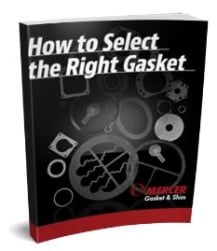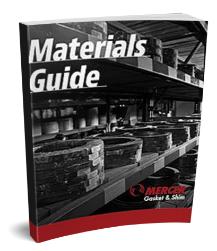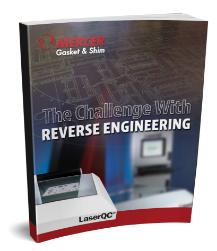Rubber/PVC Materials
Rubber is the most cost-effective material to use where temperatures and pressures are low and the chemical environment is mild. Different elastomers offer different mechanical and chemical properties. Cloth inserted materials are better able to handle movement and high compression loads.
Sponge
Neoprene, Nitrile, Silicone and Viton® are also available in sponge form. Closed cell sponge is available for applications requiring high compressibility. Open cell is available for cushioning applications where sealing is not an issue. The basic physical and chemical properties are the same as for the elastomers in the table above.
| Material | Temp. (F) | P Max (psi) | Thick. (in.) | Applications/Features |
|---|---|---|---|---|
| Butyl | -40 to 225 | 150 | 1/16 to 1/4 | Gases, inorganic acids & alkalis. Excellent weather/abrasion resistance. |
| EPDM | -40 to 212 | 150 | 1/16 to 1/4 | Water, steam, animal/vegetable oils, oxygenated solvents. Excellent weather resistance. |
| Natural (Pure Gum) | -20 to 140 | 100 | 1/32 to 1 | Acids, organic salts & alkalis. Non-toxic. Abrasion resistant. Soft. |
| Neoprene | -20 to 170 | 150 | 1/32 to 2 | Oil/gasoline. Excellent weather resistance. |
| Neoprene - Cloth Inserted | -20 to 170 | 150 | 1/32 to 1/4 | Oil/gasoline. Excellent weather resistance. Handles movement. High tensile strength. |
| Nitrile (NBR, Buna-N) | -25 to 170 | 150 | 1/32 to 2 | Oil/Aromatic fuels, mineral, animal and vegetable oils, solvents and hydraulic fluid. Available in commercial, premium and FDA grades. |
| SBR (Red Rubber) | -20 to 170 | 150 | 1/32 to 1/4 | Air, hot/cold water. |
| SBR - Cloth Inserted | -20 to 170 | 150 | 1/16 to 1/4 | Air, hot/cold water, saturated/low pressure steam. Excellent for high compression loads. Handles movement. |
| Silicone | to 400 | 150 | 1/32 to 1/4 | High temperature air or water (not oil or steam). Soft. Available in FDA grade. |
| Vinyl | 20 to 160 | 150 | 1/16 to 1/4 | Water, oxidizing agents. Excellent weather/abrasion resistance. |
| Viton® | to 400 | 150 | 1/32 to 1/4 | Oil/Aromatic fuels, mineral, animal and vegetable oils, solvents and hydraulic fluid. |
Non-Asbestos Materials
Non-Asbestos gasket materials enhance the temperature and pressure performance of rubber and vinyl by combining non-asbestos fibers with the rubber. Metal inserted materials are able to operate at even higher pressures. Non-Asbestos materials replace natural asbestos fibers in traditional gasket materials with various combinations of fiberglass, aramid, inorganic and synthetic fibers. Mercer carries Donex®, Durabla®, Garlock® and Thermoseal® (Klinger) & Victor Reinz® brands of non-asbestos gasket materials. These materials are available in thicknesses 1/64″ through 1/4″.
| Material | Max T (F) | Max P (psi) | Creep Relax'n (%) | Applications/Features |
|---|---|---|---|---|
| Non-Asbestos/ EPDM | 800 | 1200 | 15 | Steam/oxygenated solvents/ mild organic acids/alkalis. Excellent aging properties. |
| Non-Asbestos/ Hypalon | 400 | 900 | 40 | Strong organic & inorganic acids/oils/aromatic hydrocarbons, powerful oxidizing agents. |
| Non-Asbestos/ Neoprene | 800 | 1200 | 15 | Fuel/oils. Good general purpose material. |
| Non-Asbestos/ Nitrile | 800 | 1500 | 15 | Steam/oil/fuel/solvent. Excellent general purpose material with wide chemical resistance. |
| Non-Asbestos/ Nitrile - Metal Inserted | 850 | 2500 | 15 | Hot gases. High load/stress environments. Available with galvanized low carbon steel foil or mesh insert. |
| Non-Asbestos/SBR | 800 | 1500 | 15 | Steam/industrial gases. Low pressure/temperature. |
PTFE Based Materials
PTFE-based gasket materials are able to withstand significantly more aggressive chemical environments (including highly oxidizing environments) than standard non-asbestos gasket materials. However their temperature, pressure and mechanical performance is inferior to standard non-asbestos gasket materials. Metal inserted and expanded PTFE are able to operate at higher pressures. Mercer carries Garlock, Thermoseal and Gore-Tex brands of PTFE-based gasket materials. These materials are available in thicknesses 1/32″ through 1/4″.
| Material | Max T (F) | Max P (psi) | Creep Relax'n (%) | Applications/Features |
|---|---|---|---|---|
| Pure PTFE | 500 | 800 | 35 - 55 | Excellent chemical resistance. |
| Filled PTFE | 500 | 1200 | 11 - 40 | Excellent chemical resistance. |
| Filled PTFE - Metal Inserted | 500 | 2500 | 20 | Excellent chemical resistance. 316 SS perforated core. |
| Expanded PTFE | 600 | 3000 | 30 | Excellent chemical resistance. Highly compressible. |
Carbon and Graphite Materials
Carbon Fiber and Graphite Flake sheets are able to withstand significantly more aggressive chemical environments (other than powerful oxidizing environments) and higher pressures than standard non-asbestos gasket materials. Metal inserted materials are able to operate at even higher pressures. In reducing environments, pure graphite can handle up to 5000F. Mercer carries Garlock, Thermoseal and Grafoil brands of carbon and graphite based gasket materials. These materials are available in thicknesses 1/32″ through 1/4″.
| Material | Max T (F) | Max P (psi) | Creep Relax'n (%) | Applications/Features |
|---|---|---|---|---|
| Carbon or Graphite/Nitrile | 840 | 1900 | 20 | Excellent for steam. Excellent chemical resistance except powerful oxidizing agents. |
| Carbon or Graphite/SBR | 900 | 2000 | 14 | Excellent for steam. Excellent chemical resistance except powerful oxidizing agents. |
| Pure Flexible Graphite | 950 | 2100 | 5 | Excellent chemical resistance except powerful oxidizing agents. Available laminated or homogeneous. |
| Pure Flexible Graphite - Metal Inserted | 950 | 2800 | 7 | Excellent chemical resistance except powerful oxidizing agents. Available with 316 SS Foil, Mesh or Tang Core. Available laminated or homogeneous. |
Metals
Mercer fabricates solid or jacketed gaskets from any metal in any thickness. Below is a selection of the more popular metals and their performance characteristics.
| Material | Max T (F) | Metals |
|---|---|---|
| Copper | 600 | Excellent for steam. Excellent chemical resistance except powerful oxidizing agents. |
| Brass | 500 | Excellent for steam. Excellent chemical resistance except powerful oxidizing agents. |
| GHL | 212 | Excellent chemical resistance except powerful oxidizing agents. Available laminated or homogeneous. |
| Grafoil ® | 800 | Excellent chemical resistance except powerful oxidizing agents. Available with 316 SS Foil, Mesh or Tang Core. Available laminated or homogeneous. |
| Titanium | 1000 | Similar strength to 300 series stainless, but tougher and much less dense. Excellent resistance to chloride solutions (sea water) and bleaching solutions. |
| Soft Iron, Low Carbon Steel | 1000 | Soft. Will corrode in water. Mostly used where immersed in liquid hydrocarbons. |
| Stainless Steel, Type 304 | 1000 | A general-purpose, soft, corrosion-resistant, non magnetic stainless that will not harden under heat. |
| Stainless Steel, Type 316 | 1000 | Not as strong as 304, but more corrosion-resistant in chemical solutions (except for a limited range of oxiding acids) |
| Stainless Steel, Type 321 | 1600 | Stronger than 304. Used when similar performance to 304 is needed at higher temperatures. |
| Stainless Steel, Type 347 | 1600 | More corrosion-resistant and harder than 321. |
| Stainless Steel, Type 410 | 1200 | Commonly referred to as “Chrome”. This stainless will harden when heat-treated. It is highly magnetic, hard and strong, but not very corrosion-resistant. |
| Stainless Steel, Type 430 | 1400 | More corrosion-resistant than 410, but will not harden when heat-treated. This stainless is soft and no stronger than 300 series stainless. |
| Nickel | 1400 | Exhibits good corrosion and erosion resistance at moderate temperatures. |
| Monel® | 1500 | A family of nickel/copper alloys that offer greater corrosion and erosion resistance than nickel alone. Particularly useful in sea water applications. |
| Inconel® | 2000 | A family of nickel/chromium alloys that are non-magnetic and take corrosion resistance to elevated temperatures. |
| Hastelloy® | 2000 | A family of Nickel/chromium/molybdenum alloys for use in highly aggressive chemical environments at elevated temper |
Our Capabilities
Knife Cutting
Mercer Gasket & Shim’s highly accurate, state-of-the-art knife cutting capabilities allow us to deliver products to customers when speed, flexibility, and convenience are important.
Learn More Laser CuttingLaser Cutting
Specializing in fast turnaround of thin-gauge components, Mercer Gasket & Shim offers world-class laser cutting services for applications where precision is a high priority and quality is essential.
Learn More Waterjet CuttingWaterjet Cutting
Mercer Gasket & Shim’s waterjet cutting service offers a fast, flexible, and accurate method for fabricating complex or difficult parts while maintaining the integrity of the material.
Learn More Flatbed Die CuttingFlatbed Die Cutting
Our high-speed, Flatbed die-cutting can be used to create a variety of components, such as gaskets, packaging, bumpers, dampeners, labels, printed products, and more.
Learn More CNC Router CuttingCNC Router Cutting
Mercer Gasket & Shim is equipped with new, state-of-the-art router cutting equipment. We can assist with mid to high volume mass production runs.
Learn More


